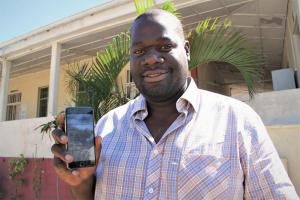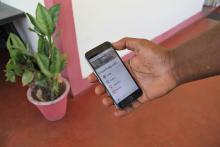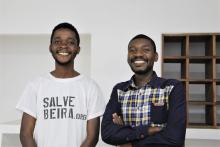Reconstructing and finding the inner strength of Beira – The profound role of technology following Cyclone Idai
9 May 2019, Beira – In an era of intensified natural disasters and catastrophic impact, communities in Africa are discovering that taking care of themselves and rising from rubble is within their reach – provided they have the right connection.
In Cyclone Idai-affected communities of Mozambique, for instance, they have learned that when they connect to the right information, they can strengthen their resilience and begin rebuilding their environment, without waiting for outside help to reach them.
Technology and communications have had many profound moments in everyday life, but clearly, helping communities find their inner strength in the aftermath of a natural calamity is a decisive one.
Mozambique suffers through floods almost annually. The immense destruction wrought by Cyclone Idai nearly two months ago has required sweeping changes that locals are finding they can manage on their own.
“As soon as I saw the information I had at my disposal in my cell phone, I immediately realized the need to spread it around the communities: I had online information on what to do to prevent cholera, on the location of the nearest health centre, on the weather forecast, on how to use the bed net to prevent malaria – all of this data compiled in one place was exactly what we needed after Idai hit us in such a disastrous manner,” says Ebel Diogo, IT Project Maganer of a Local NGO, Equipe Mozambique, Empowering Mozambique.
He and his team wanted to serve the people in Beira, which had been largely decimated by the cyclone and the massive flooding it triggered. Two weeks after Cyclone Idai made landfall, Empowering Mozambique launched a mobile application called AIDai.
“Thanks to the volunteers downloading the app and disseminating the information in the field, we reached 5000 downloads in only 30 days,” Diogo says, with the hugest smile.
The app contains a variety of useful information. From the World Health Organization, for example, there is information on health practices, such as how to treat water to prevent cholera or how to install mosquito nets to protect against malaria as well as indications on how indoor spraying will also help to prevent it. From UNICEF, the App also includes information on vaccines and child health in order to facilitate immediate action after the emergency. The information compiled is included also in the website http://mz.goodinternet.org and it is linked to the App for people to access.
Following WHO guidelines learned a through this app, people affected by the cyclone were able to purify their own water and make it drinkable, at a time when “the stock of food and water in town was critical in the initial stage of the emergency,” says Diogo.
“We included content in local languages, audio podcasts and radio messages for people to listen to the explanations in case they are not able to read the content properly,” he adds. “We are aware that not everyone here has a smartphone or speaks Portuguese, so our goal was that each one of the people downloading the app could spread it around, so that the multiplier effect would ensure that all levels of society have this kind of information. And this is exactly what happened!”
Caetano da Roda and Valgy Domingos volunteered to go to communities to spread the information contained in the app. Da Roda, a representative for New Tech Mozambique, leads the Saving Beira project, and is in charge of disseminating information to communities. He says that “sharing good practices among the members of the community was key to prevent new outbreaks and to contain the ones occurring after the cyclone, such as the cholera one”.
Domingos, who is working with da Roda to demonstrate good practices to communities, “The good thing about the app is that you do not need much data or a strong 3G connection to download it. And also, once you have done it, you can access the documents offline. So, it is very easy for people with limited resources to get the information they need.”
It was also instrumental to discovering what was there all along – their inner strength, says da Roda. “In this kind of emergency and suffering, we discovered Mozambique's human potential: All our architects, scientists and engineers have responded to high-impact social problems, and they have put their knowledge at the service of the community in order to move forward together.”






